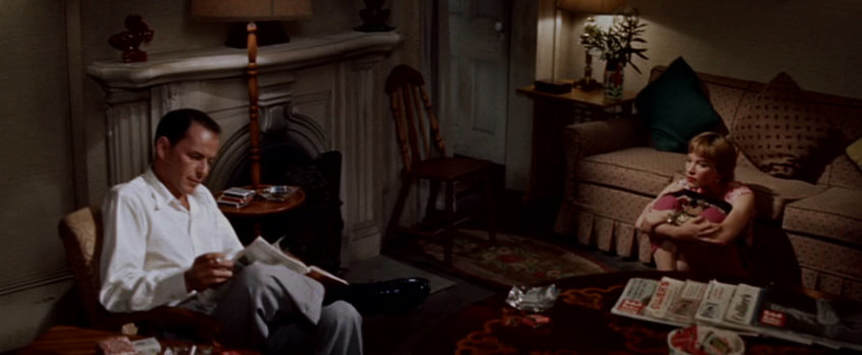|
An honest, mature work, Vincent Minnelli's Some Came Running is a dense tapestry of familial conflict, class hierarchy, and moral relativism, providing one of the most poignant deconstructions of social capital every committed to celluloid. Through its traditional linear narrative formalism, Same Came Running reveals the toxic nature which social capital can have not only on the individual, but society as a whole, as the film follows Dave Hirsh, a disenfranchised veteran returning from the war to his hometown of Parkman, Indiana. The formal definitions of protagonist and antagonist by-and-large ring hallow in Some Came Running, as every character, from Dave, to his successful businessman brother, Frank, are given dimension and depth. Same Came Running reveals the subjective nature of morality through its exploration of social capital, revealing how a character's general empathy and humanism is rarely accurately defined by either societal norms or social status. Frank and Dave are brothers placed on different sides of society, due to there class or status, yet as the film progresses Some Came Running reveals their true characters as human-being, one which goes against the social expectations. Frank is respected in society, a man whose become just as concerned with his image/status in larger society as he is with the genuine well-being of his brother, a man whom has just returned home from the war. Frank isn't a vicious character, he isn't mean-spirited, he is just oblivious, one whose self-centered nature has manifested itself to new extremes due to his financial success, as the weight of social capital, and what he could stand to lose, begin to strain his familiar relationships, in particularly with his "lower-class" brother. Frank's characterization is essentially one about the darker implications of American culture, one in which self determination can blind oneself from the importance of general humanism and empathy. Frank thinks he cares about his brother's success and well-being but it's merely a warped deception, as it's autocratic in nature, driven by his Frank's own desires for his brother to do in life what is expected of him to do. Yet as the narrative unfolds, Frank is the one whose decisions directly and indirectly bring large potential harm to those around him, his adultery not only a heinous deception to his wife, but also one that inevitably sends his daughter down a seedy path. To the audience, Frank is a character who projects he has it all together, but he doesn't', while Dave is never presented that way; Dave has problems, we know it, but we respect him more due his ability to be honest with himself, his unwillingness to dictate the lives of others while not adhering to societal demands. Dave isn't an autocrat, he simply wants to live life the way he sees fit, and while he has his own demons related to self-defeat, we respect him for not doing what his brother does - using his social capital to coerce the will of others. The social capital, or lack-there-of, is perhaps best pronounced in the film's exploration of female agency. Both main female characters in this film come from backgrounds that couldn't be more varied. Gwen French, an intellectual and creative writing teacher, presumably has nothing in common with Ginnie, the vulgar "easy" woman, yet they both struggle to be heard, due to each of them going against the larger societies implications of what a woman should and shouldn't be. Ginnie is a character whom is looked down upon due to her hedonistic behavior, much like frank, but Gwen comes from the other side of the spectrum, being a highly intelligent woman whom is respected on the surface, yet it's clear her potential is limited due to her gender. Each of these woman are victims of a society that views them as female first and not an individual, characters whom form a love-triangle with Frank; which further more pushes Minnelli's thematic assertions related to moral relativism forward. The love triangle that unfolds between these characters is presented in a geniune and mature way, one in which is emotionally messy, which finds Dave stuck between the morally acceptable, virtuous life with Gwen vs. the deprave, hedonistic life with Ginnie. It's not really a choice for Dave, as he himself is drawn heavily to Gwen, who herself struggles with the prospects of being with a semi-troubled man who appreciates her looks far more than her intellect. it's revealing that Dave doesn't directly make this choice in the end, as our vessel for this story also falls victim to his judgmental nature; he views Ginnie as a fun but beneath him, having little value to Dave due to her disinterest in intellectual pursuits. Gennie, a character whom is described as a pig in the course of the film's running time ends up being the empathetic, selfless soul in the entire story, a character whose lack of social status due to intellectual shortcomings make her an afterthought through much of the film's running time, yet in the end she is remembered for sacrificing herself for another, committed the ultimate selfless act, one which it's hard to imagine any of the other characters in this story doing. She is a passive character for much of the story, one that pales in comparison to Frank's social status among their class, but she supports him, she loves him regardless of not being able to grasp all his intellectual thoughts. Ginnie is a character whose morals would be degraded by most due to how she conducts herself, yet she comes to represent arguably the most important and humanistic quality of all - love. An incredibly dense piece of storytelling and artistry that works both intellectually and emotionally on multiple plains, Vincent Minnelli's Some Came Running is an astute study of agency, social capital, and morality, a film which pleads for less superficial judgement in society towards the individual.
0 Comments
Leave a Reply. |
AuthorLove of all things cinema brought me here. Archives
June 2023
|

 RSS Feed
RSS Feed
